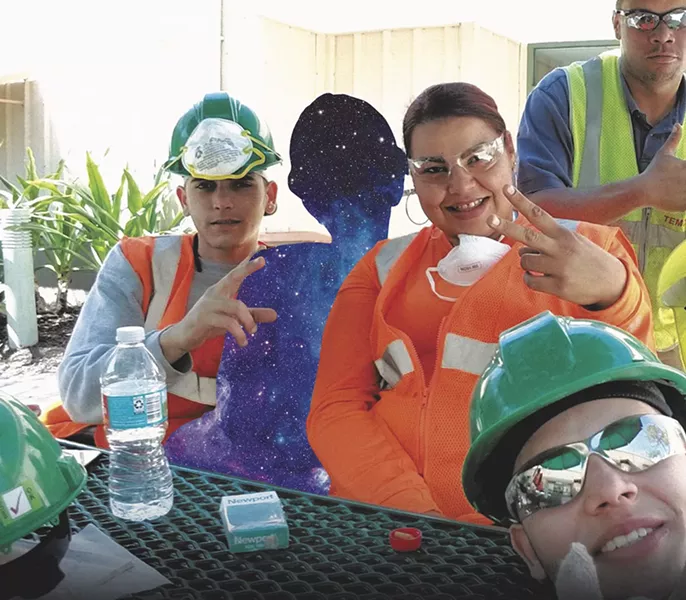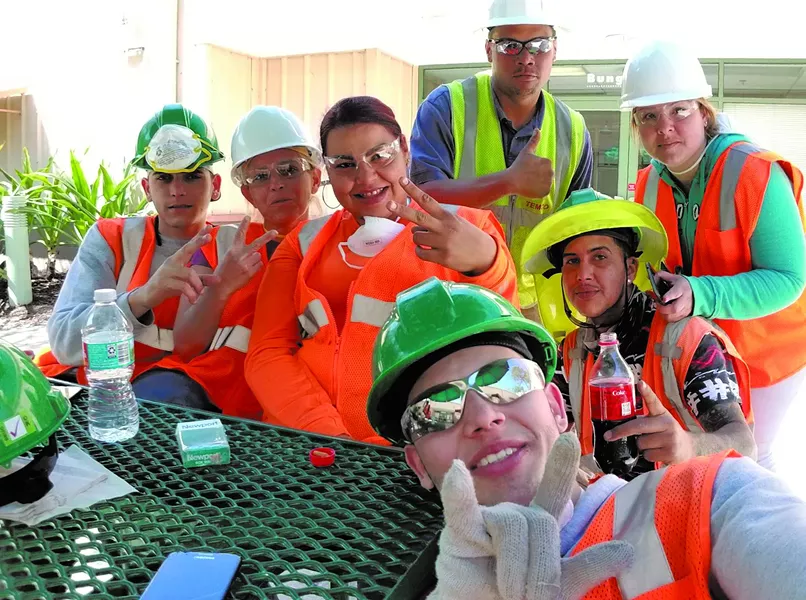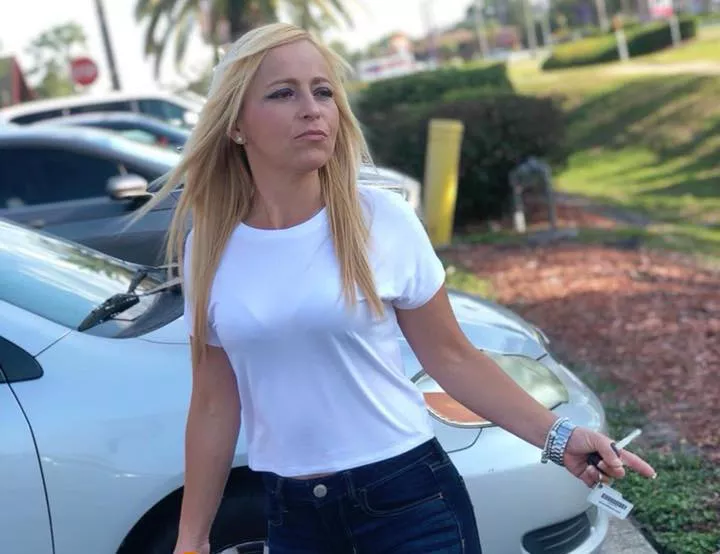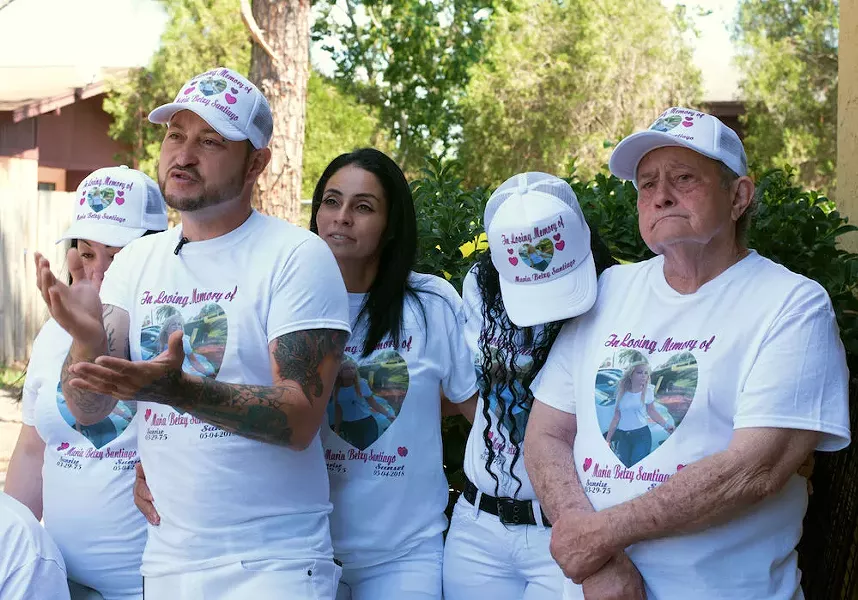Losing María

In four days, María Santiago Burgos and her two children would be homeless.
That’s all the 43-year-old could think about after FEMA had given her the ultimatum that morning. In March, her case manager told her the federal agency was extending the hotel voucher program for Puerto Rican evacuees who fled the aftermath of Hurricane María until May 14. But now, on April 16, FEMA had reversed course.
“No extensions,” her case manager said.
Santiago Burgos and about 40 other families staying at the Super 8 motel off Highway 192 in Kissimmee would be kicked out by April 20.
In the parking lot of the Super 8, families gathered at dusk to protest the last-minute decision. In a dark gray jacket too big for her body, Santiago Burgos sobbed.
“I went looking for an apartment today and, aside from that, a cheap hotel that I can pay weekly,” she told me in between tears. “But I couldn’t find anything. Where am I going to find a place to stay with two kids?”
Motels in the area that looked safe charged $300 to $400 a week – a price Santiago Burgos couldn’t afford with her low-wage construction job.
“It’s maddening,” she said in Spanish. “Imagínate. I have until Friday. How is someone supposed to find somewhere to live overnight?”
Standing beside her, her future killer nodded in agreement.
“It’s hard,” said Leumás Moraza, who would shoot Santiago Burgos in the face two weeks later. He hovered over Santiago Burgos that day as she wrung her thin hands. “There’s an overpopulation. When you try to find an apartment, they tell you the waiting list is two years, five years. What’s up with that?”
Like tens of thousands of other Puerto Ricans, Santiago Burgos fled to Florida after the hurricane; her home was damaged, and most of the island still lacked power and water. But mostly, she left because her husband’s abuse had become intolerable after the storm. She left him and her adult children on the island and escaped with her then-12-year-old son and 14-year-old daughter. When she got to the mainland, Santiago Burgos was depressed. Slowly, she got better and worked hard to get an apartment or house. But FEMA’s decision threw a wrench into her plans.
“My kids are not going to live on the streets,” she pledged. “I’m calm here. I can’t go back to Puerto Rico. No quiero. I don’t want to.”
The protest worked. By the end of the week, FEMA reversed course again, granting a last-minute extension until May 14. But Santiago Burgos wouldn’t live to see it.
By May 3, she was gone, her hopes for her family’s future bleeding out onto a motel room floor.

To her friends and family, María Santiago Burgos was simply “Betzy.”
“With her smile, she conquered the world,” her sister Jacky Santiago remembers. “Like Pinky and the Brain.”
She loved practical jokes. Once, she convinced Jacky Santiago to enter a swimsuit contest on a beach in Rincón, then booed her when she fell on stage. Whenever she heard a song she liked, especially anything by Bad Bunny, she started dancing. She dyed her brown hair a honey blonde and called herself “la rubia” from then on.
“Hellooooooooo,” she would exclaim when she walked into a room. “I’m here. Llegó la cheche!“
As a teenager, she started working in construction with her mother, Sonia Burgos, building bridges and homes in their home of Guaynabo and the rest of Puerto Rico. Later, she went to school to become a nurse and better provide for her four children.
“Her children were her strength and the greatest motivation for her to fight and achieve what she wanted,” her mother says.
Last September, Hurricane María changed everything. The cyclone hit the U.S. territory with sustained winds of 155 miles per hour, knocking out the power grid for the entire island and destroying access to clean water. Exactly how many U.S. citizens perished in the catastrophic aftermath is still unknown; the Puerto Rican government’s official death toll stands at 64, though a recently released Harvard study found that at least 793 and as many as 8,498 fatalities could be attributed to María’s aftermath. (The midpoint number, 4,645, has been widely reported.)
Santiago Burgos said her husband began abusing her shortly after they got married a year ago; sometimes, he would make her sleep on the floor. After María, it got worse. By December, Santiago Burgos told her mother she couldn’t take the humiliation anymore. Her daughter would beg her to eat, pointing to her ribs, visible beneath her skin.
“I told her, ‘Mami, send me the plane tickets,'” Santiago Burgos told me a couple weeks before her death. “I have to get out of here because he wants to kill me.”
Women, especially poor women with children, are particularly vulnerable after natural disasters, says Betty Morrow, a disaster sociologist and professor at Florida International University.
“The gender inequalities that already existed before the storm become exacerbated after the disaster,” she says.
Women are subjected to more domestic violence after a disaster, and frustrated parents lash out at their kids, leading to increased reports of child abuse. Morrow says people become increasingly vulnerable as recovery efforts drag out. After Hurricane Andrew hit Miami in 1992, spousal abuse calls to a local helpline increased by 50 percent, and out of 1,400 surveyed residents, about a third said someone in their home lost verbal or physical control in the two months after Andrew, according to the Gender and Disaster Network.
After Hurricane Katrina in 2005 and catastrophic flooding in Baton Rouge in 2016, local advocates saw that domestic violence survivors were “extremely vulnerable” to the effects of natural disasters, says Mariah Stidham Wineski, executive director of the Louisiana Coalition Against Domestic Violence.
“When you have a natural disaster like María that takes out the infrastructure of an entire area, it makes it incredibly difficult for survivors to get to law enforcement,” she says. “Because law enforcement are concentrating on rescue efforts, abusers know this and they take advantage. They feel emboldened by this lack of solid infrastructure. Imagine trying to get a protection order enforced when they can’t even find the order because the courts are flooded.”
Santiago Burgos and her two youngest children came to live with her mother in Leesburg and eventually ended up in Kissimmee, where her brother Juan Santiago lives. Santiago Burgos applied for FEMA’s Transitional Shelter Assistance program, which provides short-term hotel vouchers for evacuees who aren’t able to return home after a disaster. She moved into a Super 8 motel room with her kids and her mother.
There, she met Desiree Torres and about 60 other families who had fled the conditions in Puerto Rico. Torres got Santiago Burgos a construction job with company working on the new Star Wars: Galaxy’s Edge land at Walt Disney World. They shared food and leaned on each other for support during the stressful two weeks each month when FEMA reconsidered their case for continued hotel assistance. While most were approved, each month, some families were evicted. A few had no choice but to go back to Puerto Rico. Osceola County doesn’t have an emergency homeless shelter. Affordable housing in the area is scarce and hard to obtain – sometimes, landlords asked for two to three times the amount of rent as a security deposit.
It was here, through these cracks of insecurity, that Leumás Moraza slipped into Santiago Burgos’ life.
They had met each other 14 years ago in Kissimmee, back when Santiago Burgos was still married to the father of her last two children. Her brother Juan says Moraza, who he considered family, pursued his sister romantically even then.
“My sister never [responded] with love,” Juan Santiago says. “They never had a relationship. She only offered him a beautiful friendship that he refused to accept.”
When Santiago Burgos fled Puerto Rico, she connected with Moraza, 38, who already lived here, and he offered to help. He purchased her plane ticket when Santiago Burgos decided to come back to Florida after a brief return to Puerto Rico. He bought her gifts and household items. He tried to win over the kids with concert tickets.
“This is my best friend,” Santiago Burgos told me April 16, as Moraza stood next to her. “He’s really been my support. He’s helped me out a lot.”

But at some point, Moraza became her sombra – a shadow. Sonia Burgos says he would follow her daughter everywhere – bars, cafeterias, laundry runs. He would show up unexpectedly outside her motel room before work. When Santiago Burgos talked on the phone with anyone, no matter who it was, Moraza would get upset.
“He wouldn’t let her breathe,” Torres says. “Betzy would tell him, ‘Give me space because I’m still healing from this wound. You’re a good man, but right now, I’m not prepared to be in a relationship.’ But he wouldn’t listen.”
“He acted like he had authority over her,” Sonia Burgos adds. “As if he was her owner.”
The situation was so bad that Juan Santiago says he had to confront his old friend.
“I told him, ‘Leave my sister alone. She doesn’t want to be with you. Don’t confuse things,'” he says. “But he was suffocating her.”
Without asking her, Moraza gave up his apartment so he could help Santiago Burgos pay for a down payment on an apartment. She felt she couldn’t leave him homeless, so she offered him a spot on the motel room’s couch to crash for a couple of weeks, family and friends say.
The obsession escalated. By the end of April, Torres says Moraza told her friend that if Santiago Burgos didn’t give him a chance, he would kill himself in front of her.
“I’m tired of this,” Santiago Burgos wrote in a text, according to Torres. “I don’t know what else to do with my shadow.”
By May 3, she’d had enough. Santiago Burgos told her sister-in-law and Torres she was cutting Moraza out of her life.
“She told me, ‘Don’t worry, mami, I’m getting out of this now,'” Torres remembers. “She was drinking her coffee right here with me. She said, ‘I can’t take it anymore. I’m not happy.’ He was pressuring her on one end, and on the other end was the pressure of finding a place to live. It was too much.”
Shortly before 10:30 p.m. that night, Santiago Burgos and Moraza were arguing outside the motel room, according to a Kissimmee Police report. Her son heard his mother say she didn’t want to be in a relationship with Moraza, and that he had to leave their room. She gathered his clothes and tried to push him out by closing the door, but Moraza pushed himself inside, grabbing Santiago Burgos.
The kids screamed at him to leave their mother alone. Instead, Moraza pulled out a 9 mm Ruger handgun and pointed it at them, according to the report. As her son ran to hide, Santiago Burgos threw herself on the floor. Moraza shot her in the thigh.
Sonia Burgos, who had been in the other room, saw her daughter on the ground and charged at Moraza, pushing him onto the sofa bed. Meanwhile, Santiago Burgos’ teenage daughter dragged her into the room with her son, locking the door behind them.
The report says Moraza pushed Sonia Burgos to the ground, kicking the grandmother as she lay on the floor. He broke down the door to the room where the rest of the family were hiding and pointed his gun at Santiago Burgos.
Her daughter grabbed his shirt to stop him, but Moraza fired again – this time, hitting Santiago Burgos in the back. When she turned around, Moraza blasted the gun a third and final time. The bullet struck Santiago Burgos’ chin.
The young girl shoved Moraza into the living room and told him she was going to call the police, according to the report.
“Well, call the police,” Moraza told her before running out the door.
Santiago Burgos’ daughter called 911. A few blocks away near Emory Avenue, Moraza called 911, too.
“I was just arguing with my girlfriend, and I shot her,” he told a dispatcher through labored breaths. “I just want the police to pick me up. That’s it.”
“You’re doing the right thing by turning yourself in,” the dispatcher told Moraza on the 911 call.
Moraza told investigators he had been in an “intimate” relationship with Santiago Burgos and that, after he confronted her about possibly seeing another man, she became distant and kicked him out of the motel room. He even blamed her for the shooting – Moraza said Santiago Burgos yelled at him, “I know you always have your firearm with you. If you want, just shoot me three times,” according to the report. Moraza told detectives he “accidentally” shot her one time after she reached for the gun – though the report said he had no apparent recollection about the other two shots. Moraza faces a charge of murder and three counts of aggravated assault.
Betzy died at the hospital, just days away from getting the keys to a new apartment for her family.

Father José Rodríguez is still fuming weeks after the murder.
The priest of Jesús de Nazaret Episcopal Church in Orlando is angry at Moraza for stealing Betzy away from her children and the people who loved her.
But he is also angry at FEMA.
“FEMA’s lack of transition assistance drove this wonderful, strong human being into a vulnerable situation with a person who did not have her best intention in mind,” Rodríguez says. “Betzy is this tragic symbol of hardworking folks who are trying to do their best given the limited resources they have.”
Rodríguez is a member of Vamos4PR, a coalition of local organizations and advocates that have been helping Puerto Rican evacuees find resources while they stay in Central Florida. The group has also been instrumental in organizing people to fight for FEMA extensions on the hotel voucher program as the federal agency threatened to cut off housing aid.
Since October, FEMA says it has provided hotel rooms for more than 7,000 families who survived hurricanes Irma and María through the program; most of the families displaced by María made their way to Florida, especially Orlando and Kissimmee. But for the thousands of Puerto Ricans who evacuated to the mainland, the journey with FEMA has not been easy.
Each month, the agency found survivors not eligible for continued assistance if survivors’ homes did not have enough damage to affect habitability; if survivors’ utilities were on at the time of inspection; if survivors were staying with friends and families; and if they were not “progressing” on their long-term housing solution.
In April, the agency added more requirements at the request of Puerto Rico Gov. Ricardo Rosselló. The newest criteria disqualified people who had received two months of rental assistance or whose residences were being repaired under Puerto Rico’s emergency housing rebuilding program. Rosselló had expressed concern about the “millions” of Puerto Ricans who could be leaving the U.S. territory, creating a “brain drain” on the island.
Hardly anyone met the new criteria, including Santiago Burgos and about 1,800 other evacuees staying in Florida. At the Super 8 motel alone, 43 families would have to pay for their rooms or be forced to leave the motel.
As families were leaving the hotels on the cutoff date of April 20, FEMA announced it would extend the program until May 14.
In the hours before Santiago Burgos was killed on May 3, FEMA made another announcement: The agency had approved Rosselló’s request for an “unconditional extension” for families in the program through June 30 and would provide plane tickets back to Puerto Rico for anyone who wanted to go home.
Ericka Gómez-Tejeda, a community organizer with Vamos4PR, says that night, the group organized a prayer to thank FEMA for the extension and celebrate that the protests worked. She remembers Santiago Burgos told her she would be there, but she never showed up.
After the shooting, Gómez-Tejeda and other advocates scrambled to provide resources to the affected families and pay for her funeral.
“María was so positive and funny, like a little firecracker,” Gómez-Tejeda says. “Every time she saw me, she told me about some progress she made. She was a woman of action, and she was so proud of her kids. What makes María special, in addition to who she was, is that she represented the best of the families there.”
Gómez-Tejeda had met Santiago Burgos about a month before at another protest aimed at FEMA. Vamos4PR helped connect her with a job fair, where Santiago Burgos found multiple job openings, including one for a nurse position at Osceola Regional Medical Center. She just needed her nursing license to be validated by the state. Santiago Burgos also received help from Father Rodríguez – the church paid for the security deposit she needed to get an apartment.
“Betzy had to front three months’ worth of rent for the deposit,” Rodríguez says. “Anecdotally, we’ve heard of families paying more than 50 percent of their income to rent. Some of them go as high as 75 percent of their income. We’re trying to convince people not to sign these leases, but for some of them, it’s the only option they have as working families.”
Rodríguez points out that the federal agency has refused to expand its Direct Lease program, which could pay for longer-term rentals, to Puerto Rican evacuees staying in Florida. In December, Rosselló requested that FEMA activate the Disaster Housing Assistance Program, which provides rent to eligible families to help pay for temporary housing for up to 18 months and has been used before for disaster victims in the aftermath of hurricanes Katrina, Ike and Gustav. On May 15, FEMA denied that request.
U.S. Rep. Darren Soto, D-Orlando, has joined with U.S. Sen. Bill Nelson to push for legislation that would force FEMA and the federal Department of Housing and Urban Development to activate DHAP for victims of hurricanes Irma and Maria through February 2019. Soto says that, for months, evacuated Puerto Rican families have lived on edge because of how FEMA has conducted its housing aid program. As of May 14, FEMA says 2,204 families are using Transitional Shelter Assistance at hotels in more than 30 states and Puerto Rico.
“I believe FEMA has underfunded the Hurricane María effort,” Soto says. “They’re looking to cut corners where they can fiscally, which is why they won’t expand this program. It seems like a lot of folks in Congress feel like Puerto Rico should just be happy with what it gets, which is really tragic and problematic, given that they’re Americans like everybody else.”
In a statement, FEMA spokesperson Ron Roth says because of “lessons learned” from previous disasters, DHAP will not be implemented for Puerto Rico recovery efforts. Roth points to a 2011 report from the U.S. Department of Homeland Security that recommended FEMA not enter into additional DHAP agreements until “reliable program effectiveness and cost information has been developed.”
“It wasn’t a perfect solution,” Roth says. “[That is] why HUD and FEMA are working to jointly identify those who meet criteria and help them directly.”
Asked if FEMA has underfunded restoration efforts after Hurricane Maria, Roth says the agency has provided $710 million in housing assistance alone for Hurricane María survivors as of May 14.
Rodríguez maintains that FEMA has “failed in its duty to care” for the people who fled Puerto Rico.
“I hold FEMA responsible for not having a program in place to help vulnerable people like Betzy,” Rodriguez says. “June 30 is approaching, and some of these families are going to fall off the cliff because there’s no transition help for them.”
Desiree Torres left Betzy’s funeral early. She couldn’t stand to see her friend in the coffin – it seemed like another person was there.
“I can’t explain it, but she looked like she was still struggling to live,” Torres says. “Her life was stolen. It was not her time.”
Before the service, Sonia Burgos talked about her daughter’s dreams. Santiago Burgos wanted to work as a nurse in Kissimmee and give her kids a stable home. She wanted her family to be united.
“I would tell her, ‘Dale pa’ lante! Dale pa’ lante, que tú puedes. You’re a warrior. You’re a fighter,'” Burgos says. “I told her I would be there for her always. She was the light of my eyes. And she always will be.”
At the funeral, Father Rodríguez remembered Santiago Burgos as an advocate for her boricuas in Kissimmee. Toward the end of the funeral, family and friends gave Santiago Burgos three rounds of applause for a job well done as a mother and daughter.
“She fought the good fight and she succeeded,” Rodríguez says. “She was murdered, but she did not fail. She accomplished a lot of things for herself, her children and her community. She fulfilled her duty of care.”